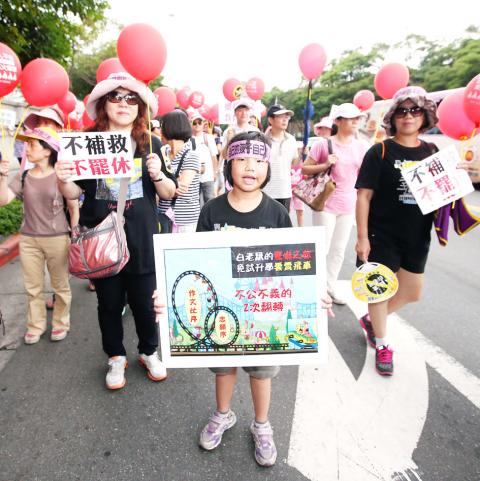Demonstrators took to the streets of Taipei yesterday against a new mechanism in senior-high school admittance, which they say is unfair because it does not take into account students’ grades.
The mechanism is part of the new 12-year national education system and deducts points from students each time they fail to be accepted by a school on their list, which effectively punishes children for aiming too high.
Hundreds of parents and teachers took part in the parade, organized by the Alliance on Obligatory Education.

Photo: CNA
They gathered on Ketagalan Boulevard, saying the mechanism is unfair because some students in the first phase failed to land a school, even though they obtained high grades in examinations.
“We have to save our own children, save our own future and our nation on our own,” they said.
“We want adaptive education and real democracy,” they chanted. “We want the point deduction mechanism abolished.”
The alliance said that the Chinese Nationalist Party (KMT) legislators, having a majority of seats in the legislature, passed the Senior-High School Education Act (高級中等教育法) in June last year, and directly enforced the new 12-year national education system, without testing the system in advance.
This new senior-high school admittance process is like gambling, protesters said, adding that it deprives the parents of their right to choose the best education for their children.
“Why can the system not be made transparent so that students can choose the school they want according to their results?” one protester said.
“While the first phase of the admittance results have been announced, we want remedial measures in place for the second phase,” a parent said, while another parent shouted: “Minister of Education Chiang Wei-ling (蔣偉寧) step down from your post.”
A teacher surnamed Chang (張) said she was dissatisfied with the point deduction mechanism, which left six of her 10 highest-graded students without a school.
A parent surnamed Wang (王) said: “My son was shocked when he saw he was unable to land any schools, even though he scored 5 A’s and filled in 30 preferred schools.”
Another parent surnamed Lin (林) said there was no guidance for families to refer to when they filled in the school preference section, so it felt like gambling on their children’s future.
The protesters ended their demonstration at the Legislative Yuan, where they split into discussion groups for, what they called, “deliberative democracy on the streets” over two topics: whether point deduction should be enforced and how the entrance mechanisms should be redesigned.
The demonstrators also asked for grade intervals to be made smaller, as well as for the officials responsible for the flawed system to be punished.

Authorities have detained three former Taiwan Semiconductor Manufacturing Co (TMSC, 台積電) employees on suspicion of compromising classified technology used in making 2-nanometer chips, the Taiwan High Prosecutors’ Office said yesterday. Prosecutors are holding a former TSMC engineer surnamed Chen (陳) and two recently sacked TSMC engineers, including one person surnamed Wu (吳) in detention with restricted communication, following an investigation launched on July 25, a statement said. The announcement came a day after Nikkei Asia reported on the technology theft in an exclusive story, saying TSMC had fired two workers for contravening data rules on advanced chipmaking technology. Two-nanometer wafers are the most

Tsunami waves were possible in three areas of Kamchatka in Russia’s Far East, the Russian Ministry for Emergency Services said yesterday after a magnitude 7.0 earthquake hit the nearby Kuril Islands. “The expected wave heights are low, but you must still move away from the shore,” the ministry said on the Telegram messaging app, after the latest seismic activity in the area. However, the Pacific Tsunami Warning System in Hawaii said there was no tsunami warning after the quake. The Russian tsunami alert was later canceled. Overnight, the Krasheninnikov volcano in Kamchatka erupted for the first time in 600 years, Russia’s RIA

CHINA’s BULLYING: The former British prime minister said that he believes ‘Taiwan can and will’ protect its freedom and democracy, as its people are lovers of liberty Former British prime minister Boris Johnson yesterday said Western nations should have the courage to stand with and deepen their economic partnerships with Taiwan in the face of China’s intensified pressure. He made the remarks at the ninth Ketagalan Forum: 2025 Indo-Pacific Security Dialogue hosted by the Ministry of Foreign Affairs and the Prospect Foundation in Taipei. Johnson, who is visiting Taiwan for the first time, said he had seen Taiwan’s coastline on a screen on his indoor bicycle, but wanted to learn more about the nation, including its artificial intelligence (AI) development, the key technology of the 21st century. Calling himself an

South Korea yesterday said that it was removing loudspeakers used to blare K-pop and news reports to North Korea, as the new administration in Seoul tries to ease tensions with its bellicose neighbor. The nations, still technically at war, had already halted propaganda broadcasts along the demilitarized zone, Seoul’s military said in June after the election of South Korean President Lee Jae-myung. It said in June that Pyongyang stopped transmitting bizarre, unsettling noises along the border that had become a major nuisance for South Korean residents, a day after South Korea’s loudspeakers fell silent. “Starting today, the military has begun removing the loudspeakers,”